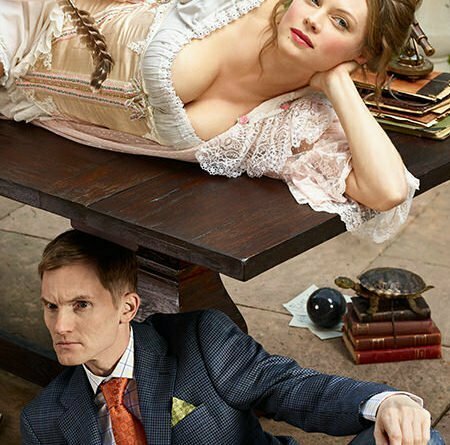Arcadia
By Tom Stoppard
Directed by Michael Halberstam
Produced by Writers Theatre, Glencoe
The Life of the Mind Finds a New Home
Writers Theatre is entering a new phase in its history, with the opening of a $28 million dollar new theatre complex. So what better way for the literary-oriented company to celebrate than Arcadia, one of the densest works by one of the most famously intellectual contemporary playwrights? Besides thermodynamics, determinism, historiography, and the transformation of knowledge into meaning, landscape architecture is one of the major themes of the play. And though the new building, located close to Writers’ old home at Books on Vernon, still needs to go through some adjustments before becoming a completely comfortable space (I hurt my knee before the press opening and the accessibility ramp lacks a railing), it has already proven it retains the company’s highly-valued intimacy, and that artistic director Michael Halberstam knows how to use his larger stage.
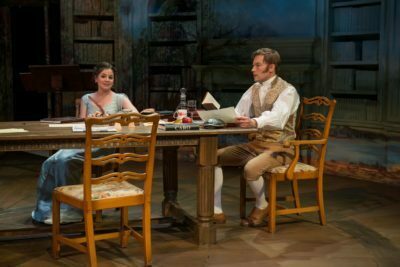
The story takes place at Sidley Park, a British country estate, with scenes alternating between the early nineteenth century and the present. The first lines in the play, in 1809, are those of a teenage girl, Thomasina Coverly (Elizabeth Stenholt), asking her tutor, Septimus Hodge (Greg Matthew Anderson), to explain to her what a “carnal embrace” is. Hodge, we learn, is a bit of a cad, and though not particularly interested in exploiting his student, he has been enjoying the attentions of her mother, Lady Croom (Chaon Cross), while engaging in dalliances in the new gazebo with the wife of a poet he intends to rip in a literary journal. That poet, Ezra Chater (Rod Thomas), bursts in intending to duel Hodge, but is pacified by flattery, and comes to believe that his wife only offered herself to Hodge so that he would be guaranteed a good review. Hodge relies on other people’s stupidity as much as his own cleverness to get himself out of tight spots, but it works. Thomasina is one of the very few people besides his friend Lord Byron he sees any intellectual promise in. She has just realized that, theoretically, according to Isaac Newton’s laws of physics, all future motions have already been predetermined, even though nobody could ever do the equations to discover what exactly the future holds.

In the future, two scholars have converged on Sidley Park while researching the mysterious aftermath of the Chater affair. Hannah Jarvis (Kate Fry) recently wrote a popular biography of Caroline Lamb, one of Lord Byron’s lovers. She has come to Sidley Park because she is interested in using its ornamental hermit, who appeared sometime after 1812, as a jumping off-point for her next book. Somebody early in the nineteenth century at Sidley Park who she connects with the hermit wrote thousands of equations for an unclear reason, and she sees this as a metaphor for how Enlightenment rationalism gave way to Romanticism. But first, Jarvis has to uncover the hermit’s identity. Bernard Nightingale (Scott Parkinson) is a literary academic who wrote a scathing review of Jarvis’s book, but now wants her help investigating Chater. He believes Byron killed Chater in a duel, and sees correspondence that passed through Hodge’s hands as evidence of his theory.
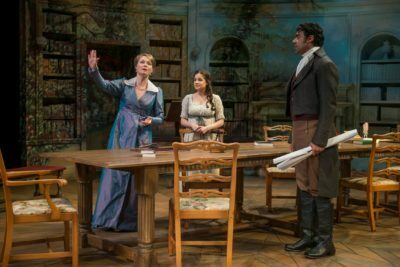
Director Michael Halberstam does a remarkable job of keeping the story clear. Part of Stoppard’s concept is that the visual distinctions between the eras break down as the play goes on. The modern members of the Coverly family end up dressing like their ancestors for a special event (costumes by Rachel Anne Healy), and the room changes very little between scenes (scenic design by Collette Pollard). And yet, not only are we able to follow the plot developments, we are able to do so easily enough to laugh at Nightingale’s hubris when he makes “discoveries” that are completely off-base, but supported by how he chooses to interpret evidence. The play itself has a few false endings, and sags slightly in the final scenes when it should be climaxing, but it always remains interesting, not only intellectually, but on an emotional level.
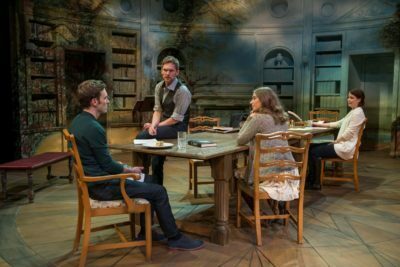
As always, a great deal of credit needs to go to the twelve-member ensemble, who make each character memorable. Scott Parkinson’s Nightingale is a pompous, satirical figure, but is played with such excitability it’s hard not to enjoy his scenes. It helps that he gets frequently and deservingly humiliated. Greg Matthew Anderson’s Hodge is a more self-assured snob, standing with his feet perpendicular to show off his hosiery while he asserts his verbal power over his enemies. Kate Fry’s Hannah Jarvis is far more humble, being partly aware that her work would not pass academic muster and used to being ignored or shouted at because she is a woman. But she still revels in one-upping Nightingale, and is excited by the philosophical implications of mathematical experimentation.
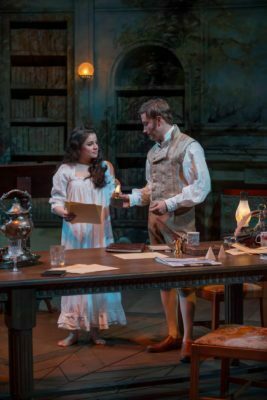
Chris Sheard plays Valentine Coverly, the modern heir to Sidley Park, and a mathematician. He’s a sweet guy who feeds the two-hundred year old family tortoise from the table and jokingly calls Jarvis “fiancé” to cover for his embarrassment over his crush on her. His description of his attempt to describe changes in the estate’s grouse population through algebra is the vehicle through which Stoppard introduces the discussion of mathematical philosophy which dominates much of the play. But Valentine also displays a more subtle sexism than Nightingale: he simply cannot believe that Thomasina may have been the one who created the books filled with equations Jarvis uncovers, despite evidence that she understood some principles of chaos theory decades before they were formally described. (But, really, he points out, she would be crazy even if she did, since without a computer, she’d never get far enough to produce useful results. There’s evidence that Hodge could be the author too, but Valentine finds Thomasina’s notebooks particularly upsetting.)
Elizabeth Stenholt plays Thomasina as bright and appealing, but it’s never clear how much she really knows. That goes as much for her sexual naiveté as the implications of her work (although she ages three years over the course of the play). Alistair Sewell plays both the teenage Lord Augustus and his modern-day descendent, Valentine’s brother, Gus; the former is spoiled and demanding while the second is autistic. Sewell is completely believable as each, but Stoppard deliberately creates a disorienting effect by putting them in similar clothes, making it initially unclear upon their entrances which we are seeing once the scenes start overlapping.
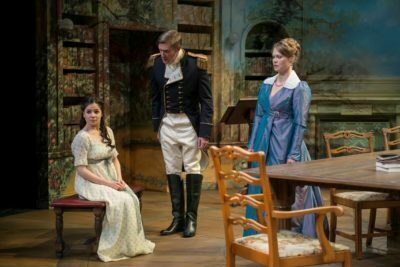
One of the most significant accomplishments of this production is how in tune it is with Stoppard’s sense of humor. Some of the characters are drawn much more realistically than others, but they all fit within the unique world of the play. Through mouthpieces like Hodge and Valentine, Stoppard even does a decent job of explaining what the mathematical concepts being discussed are and why they are important. Well, important to some people, at least. The most passionate speeches in the play are debates between the characters over the importance of truth and myths. The end of the Enlightenment which Jarvis refers to partly resulted from the realization that some things are beyond human understanding, at least currently, and that people have to find a way to accept that while still applying new knowledge with unpredictable results. The one serious criticism to be made of the production is that the characters’ attraction to each other is still too cerebral, and uncomfortable aspects of Writers’ new theatre, especially its heating problem, may be partially to blame. But what this production of Arcadia does provide, it does outstandingly. For a think-piece, there are few shows that can top this.
Highly Recommended
Jacob Davis
[email protected]
Reviewed March 23, 2016
This show has been Jeff recommended.
For more information, see Arcadia’s page on Theatre in Chicago.
Playing at Writers Theatre on 325 Tudor Court, Glencoe, Illinois. Tickets start at $35; to order, call 847-242-6000 or visit writerstheatre.org. Performances are Tuesdays-Friday at 7:30 pm (with select 3:00 pm Wednesday matinees), Saturday at 3:00 pm and 7:30 pm, and Sunday at 2:00 pm and 6:00 pm through May 1. Running time is three hours with one intermission.

